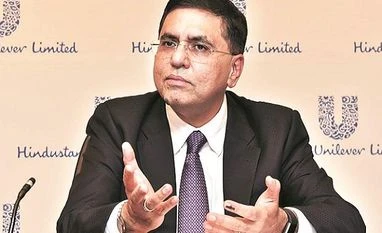FMCG major HUL Chairman Sanjiv Mehta on Tuesday cautioned that the "risk of recession remains real" but it must not be taken as a foregone conclusion while stating that the path back to growth will depend on a range of drivers, including the trajectory of coronavirus, effectiveness of containment efforts and economic steps taken by governments, among others.
Addressing shareholders at the company's annual general meeting online, Mehta also said the the Centre, which has taken several measures to boost the economy, "should keep a close watch on the demand situation and step in unhesitatingly if it does not pick up in the next few months".
From a demand perspective the fear of loss of jobs, dwindling earnings and eroding investments have made people circumspect with their spends and a slow down in the wheels of the economy could lead to a financial crisis in several parts of the world, he added.
"Whether economies can avoid the recession or not, the path back to growth will depend on a range of drivers, such as the trajectory of virus, the effectiveness of containment efforts, the economic steps taken by the governments, the reaction and behaviour of the firms and consumers, the degree to which demand will be delayed or lost, whether the shock is truly a spike or lasts, or whether there is structural damage to the economy.
"The risk of recession remains real, but we must not take it as a foregone conclusion, he said.
He termed several measures announced by the Centre such as increased allocation under MGNREGA Scheme, direct transfer of cash and increasing the Minimum Support Price and collateral-free loans to MSMEs, among others as necessary steps "and they will have a trickle-down effect on demand".
However, Mehta said, "The debate remains whether these are sufficient to kickstart a virtuous spiral of growth or would it require a substantive demand-side stimulus."
Given the limited fiscal space, he said, "It is not easy for the government to have a large demand-led stimulus and it must be concerning the government that if they go down this route, a large part of the stimulus could end up as savings rather than being spent to generate demand.
"Having said that the government should keep a close watch on the demand situation and step in unhesitatingly if it does not pick up in the next few months."
Commenting on operations of the company during pandemic, Mehta said extreme speed and agility were paramount to overcome the operational challenges during the hard lockdown.
It has shortened the entire planning to execution cycle to a daily horizon, hundred instances of critical material supply disruptions were handled with speed by onboarding dozens of new suppliers and HUL's trucking capacity was restored at twice the rate of national trucking recovery, eliminating key logistics bottlenecks, he added.
Moreover, the epidemic has accelerated the nation''s digital journey, much in the same way demonetisation did for adoption of digital payments, he said.
"We need a digital backbone connecting every part of our country. Maybe it is time to digitally connect every village with the same tenacity as we did the electrification drive. There is no doubt that the above shifts will take concerted public-private effort and the rewards are big," said Mehta.
Hindustan Unilever has been using technology in a big way for quite some time now.
Its connected store programme has evolved further and now includes app-based ordering and digital payments for stores and is live in more than one lakh 11 stores enabling a frictionless experience he added.
Post a successful pilot, we are now scaling up the fully automated fulfilment centre a robotics and guided vehicles powered warehouse. Combined with Machine Learning powered demand management and IoT-enabled digital factories, this is creating increased agility across the fulfilment value chain, he said, adding we have also developed an app for our factory operations which has temperature measurement access control, an alarm if physical distancing is not maintained and facilitates contact tracing.
Mehta said power of these digital capabilities became apparent during the Covid-19 lockdown. In some areas, where salesman could not physically reach the stores to take order, app-based ordering capability was quickly rolled out to restore HUL's ability to capture orders and meet consumer demands.
"Similarly, extensive data about the stores and market they operate in helped us to almost overnight redesign the service model and create new optimised routes for delivery avoiding containment zones and other restrictions. Here also the power of automated warehouse kicked in and enabled us to deliver to stores even in situations where the distributor was not operational, he said.
When Covid-19 hit India, HUL immediately earmarked Rs 100 crores to help the country fight this crisis and its approach has been very focused, he said.
HUL had reduced the prices of their soaps and disinfectants to make them affordable and accessible to people and had reached out to thousands of people in the marginal sections of society with food and hygiene kits.
Unlock 30+ premium stories daily hand-picked by our editors, across devices on browser and app.
Pick your 5 favourite companies, get a daily email with all news updates on them.
Full access to our intuitive epaper - clip, save, share articles from any device; newspaper archives from 2006.
Preferential invites to Business Standard events.
Curated newsletters on markets, personal finance, policy & politics, start-ups, technology, and more.
)